人教版(2019)必修第三册 Unit3 Diverse Cultures Discovering useful strutures 精品课件(1)(共32张PPT)
文档属性
| 名称 | 人教版(2019)必修第三册 Unit3 Diverse Cultures Discovering useful strutures 精品课件(1)(共32张PPT) |
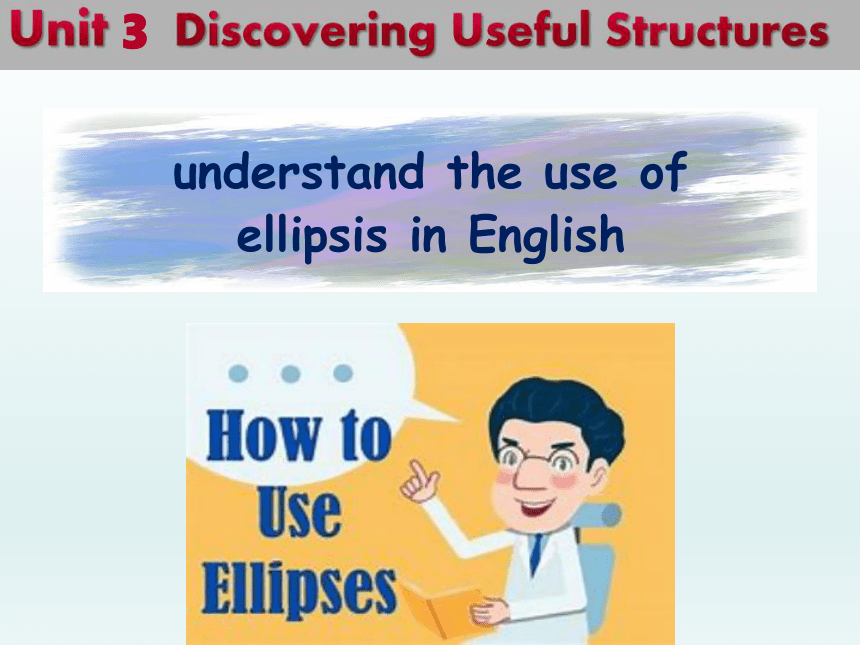
|
|
| 格式 | pptx | ||
| 文件大小 | 1.0MB | ||
| 资源类型 | 教案 | ||
| 版本资源 | 人教版(2019) | ||
| 科目 | 英语 | ||
| 更新时间 | 2023-03-10 18:10:54 | ||
图片预览

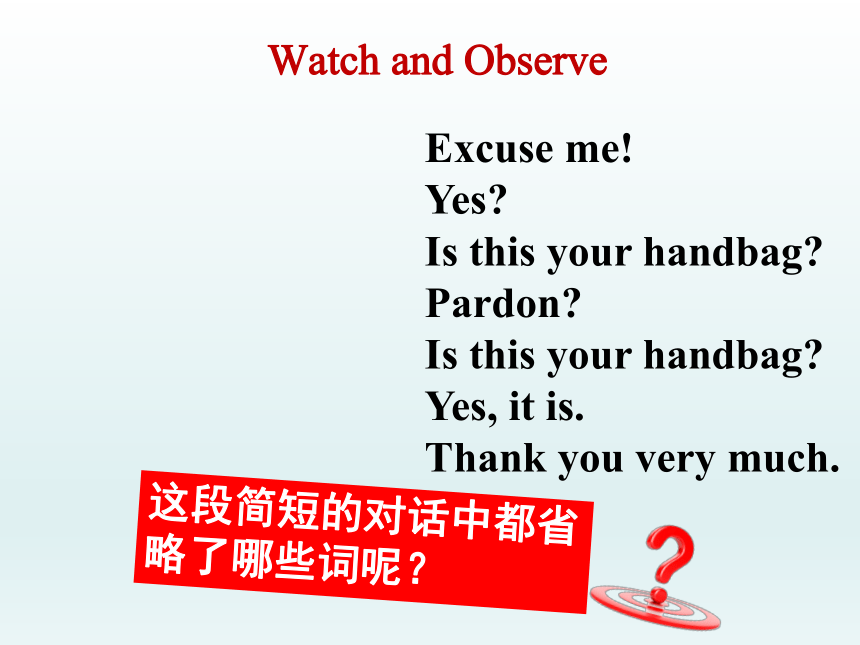
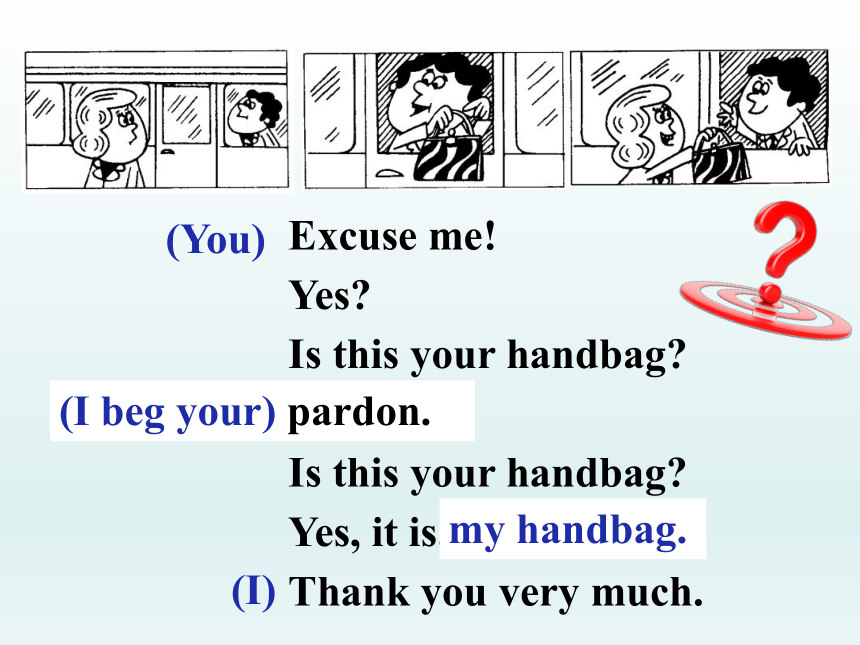
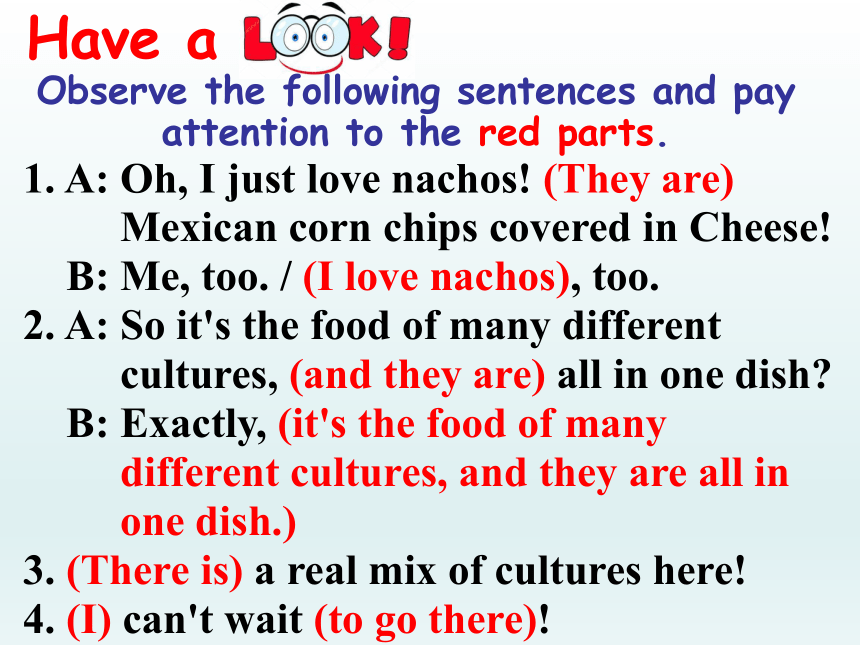
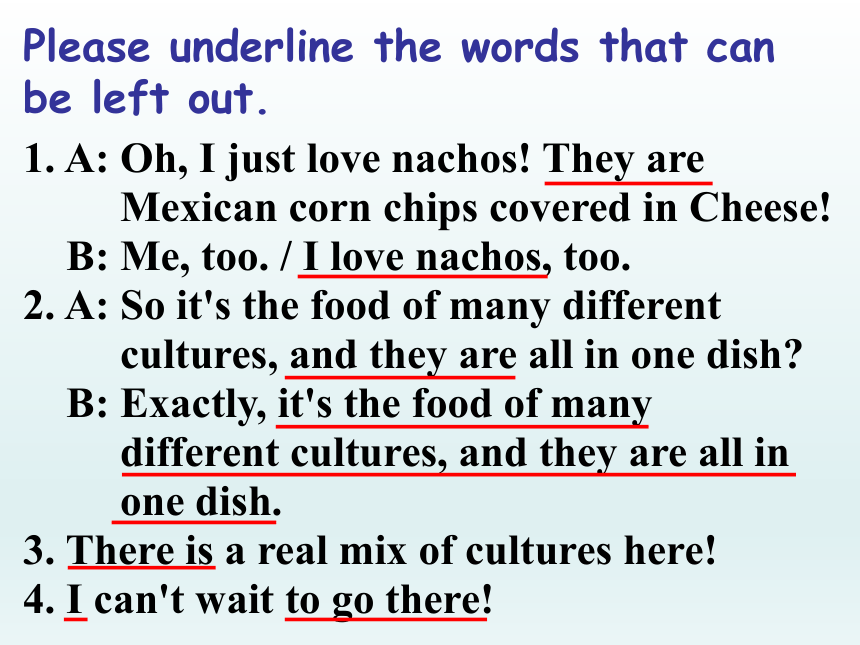
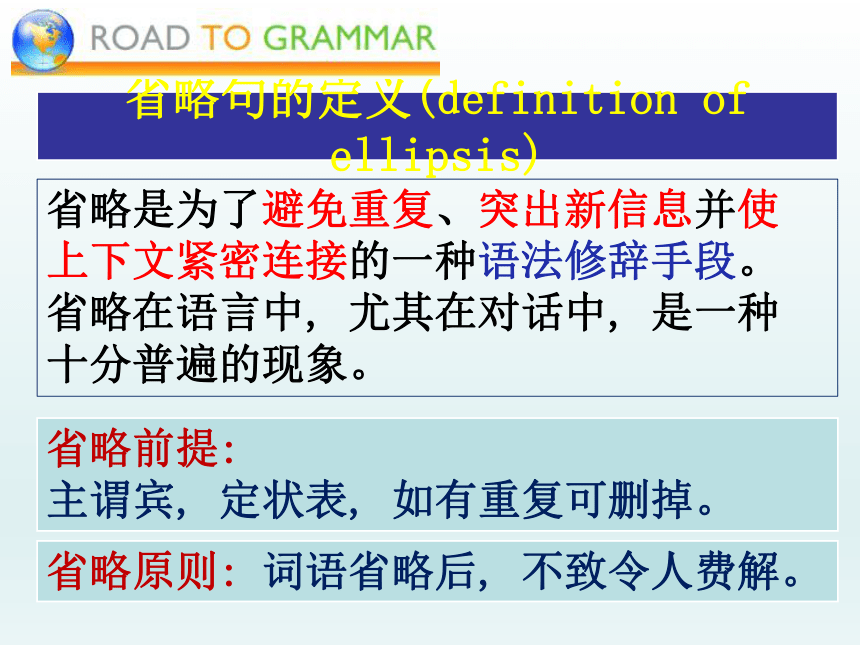
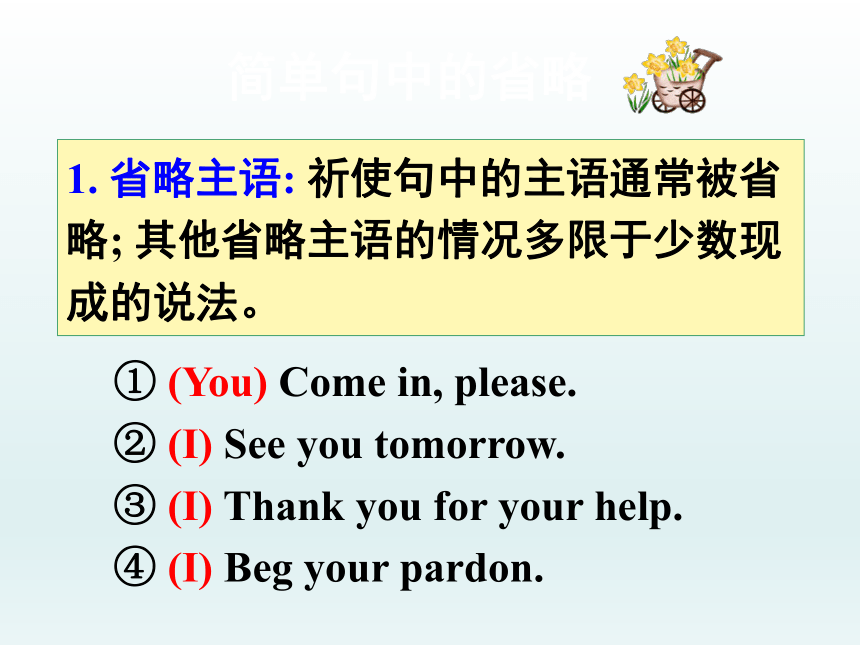
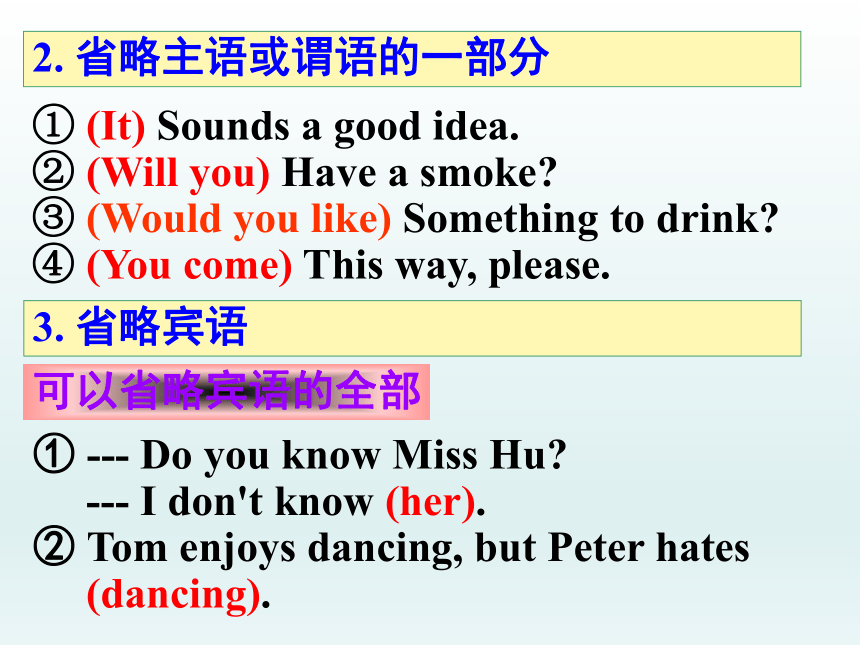
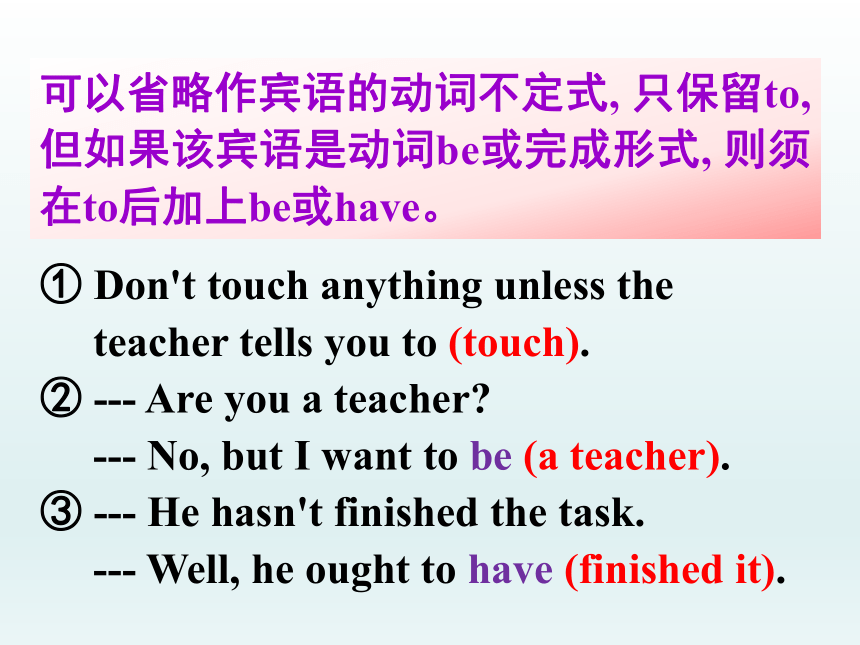
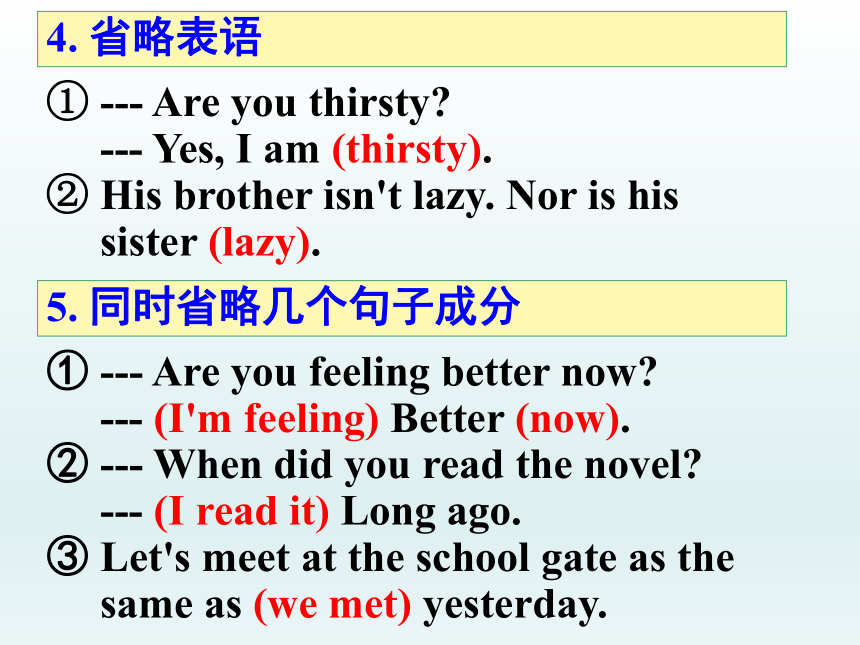
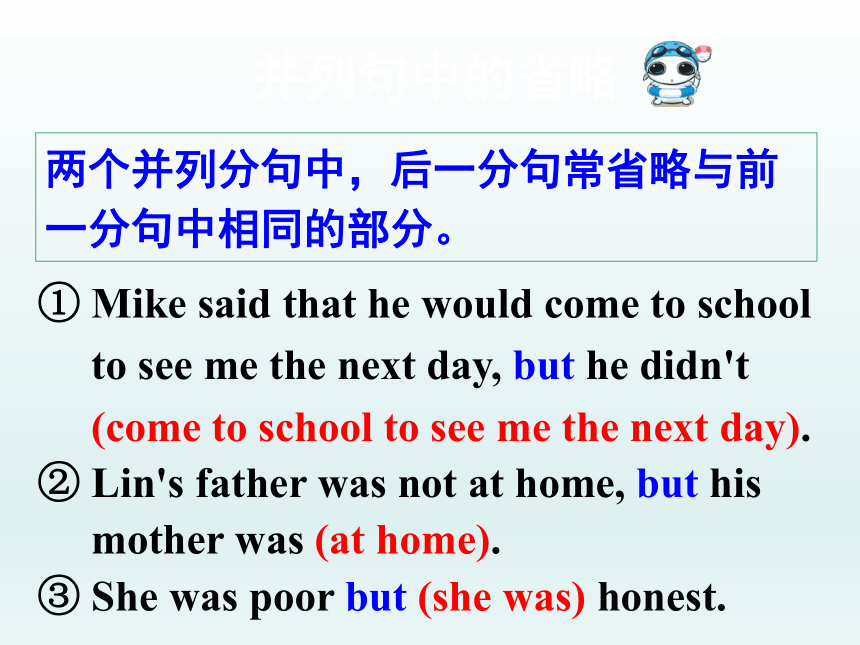
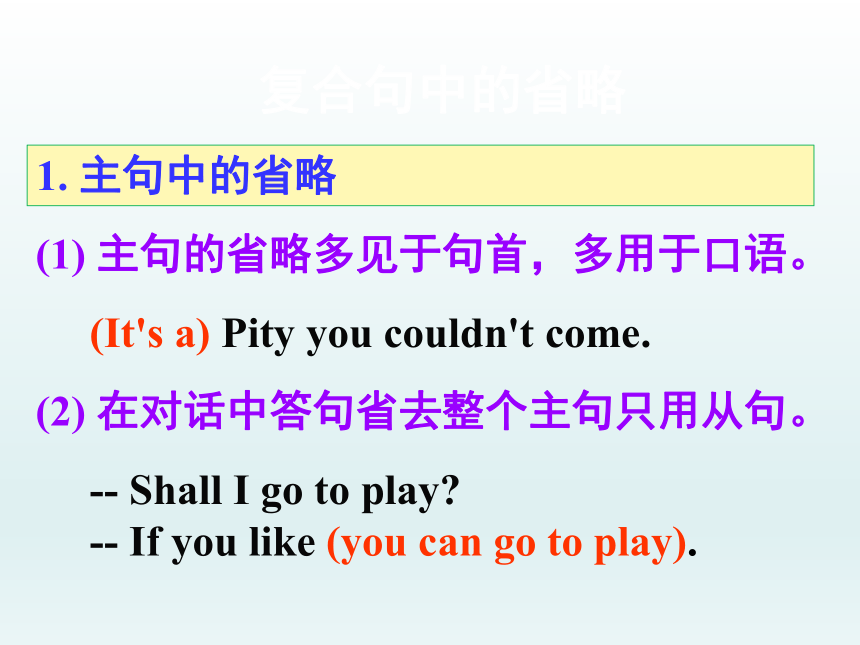
文档简介
(共32张PPT)
understand the use of ellipsis in English
3
Excuse me!
Yes
Is this your handbag
Pardon
Is this your handbag
Yes, it is.
Thank you very much.
这段简短的对话中都省略了哪些词呢?
Watch and Observe
Excuse me!
Yes
Is this your handbag
Pardon
Is this your handbag
Yes, it is.
Thank you very much.
(You)
(I beg your) pardon.
my handbag.
(I)
Have a
Observe the following sentences and pay attention to the red parts.
1. A: Oh, I just love nachos! (They are)
Mexican corn chips covered in Cheese!
B: Me, too. / (I love nachos), too.
2. A: So it's the food of many different
cultures, (and they are) all in one dish
B: Exactly, (it's the food of many
different cultures, and they are all in
one dish.)
3. (There is) a real mix of cultures here!
4. (I) can't wait (to go there)!
Please underline the words that can be left out.
1. A: Oh, I just love nachos! They are
Mexican corn chips covered in Cheese!
B: Me, too. / I love nachos, too.
2. A: So it's the food of many different
cultures, and they are all in one dish
B: Exactly, it's the food of many
different cultures, and they are all in
one dish.
3. There is a real mix of cultures here!
4. I can't wait to go there!
省略句的定义(definition of ellipsis)
省略是为了避免重复、突出新信息并使
上下文紧密连接的一种语法修辞手段。
省略在语言中, 尤其在对话中, 是一种
十分普遍的现象。
省略前提:
主谓宾, 定状表, 如有重复可删掉。
省略原则: 词语省略后, 不致令人费解。
① (You) Come in, please.
② (I) See you tomorrow.
③ (I) Thank you for your help.
④ (I) Beg your pardon.
简单句中的省略
1. 省略主语: 祈使句中的主语通常被省略; 其他省略主语的情况多限于少数现成的说法。
① (It) Sounds a good idea.
② (Will you) Have a smoke
③ (Would you like) Something to drink
④ (You come) This way, please.
2. 省略主语或谓语的一部分
3. 省略宾语
① --- Do you know Miss Hu
--- I don't know (her).
② Tom enjoys dancing, but Peter hates
(dancing).
可以省略宾语的全部
① Don't touch anything unless the
teacher tells you to (touch).
② --- Are you a teacher
--- No, but I want to be (a teacher).
③ --- He hasn't finished the task.
--- Well, he ought to have (finished it).
可以省略作宾语的动词不定式, 只保留to, 但如果该宾语是动词be或完成形式, 则须在to后加上be或have。
① --- Are you thirsty
--- Yes, I am (thirsty).
② His brother isn't lazy. Nor is his
sister (lazy).
4. 省略表语
① --- Are you feeling better now
--- (I'm feeling) Better (now).
② --- When did you read the novel
--- (I read it) Long ago.
③ Let's meet at the school gate as the
same as (we met) yesterday.
5. 同时省略几个句子成分
两个并列分句中,后一分句常省略与前一分句中相同的部分。
① Mike said that he would come to school
to see me the next day, but he didn't
(come to school to see me the next day).
② Lin's father was not at home, but his
mother was (at home).
③ She was poor but (she was) honest.
并列句中的省略
1. 主句中的省略
(1) 主句的省略多见于句首,多用于口语。
(It's a) Pity you couldn't come.
(2) 在对话中答句省去整个主句只用从句。
-- Shall I go to play
-- If you like (you can go to play).
复合句中的省略
2. 宾语从句中的省略
(1) 由which, when, where, how和why引导的宾语从句,可全部或部分省去,只保留引导词。
Please pass me one of these books and I don't care which (you pass me).
(2) 在I'm afraid, I think, I believe, I hope, I guess等开头的作答句中,后面跟so与 not分别用于肯定或否定宾语时,宾语从句可省去。
-- Do you think it will rain
-- I hope not (that it will not rain).
3. 状语从句中的省略
(1) 状语从句出现在句末时,一般都可以作句尾省略。
① John will go if Mary will (go).
② You can ask me questions if (there are)
any (questions).
(2) 有时条件从句可以完全省去,只剩下主句。
I would have come yesterday (if I had wanted to).
(3) 以as, than引导的比较状语从句可以全部或部分省去。
After half an hour, she became quieter (than she had been).
(4) 在表示时间、地点、条件、让步等的状语从句中,从句的主语如与主句的主语相同,常省略从句的主语和谓语。
① When (you are) crossing the road,
you'd better look at both sides.
② Unless (I am) invited I will not go.
③ While (he was) on a walking tour with his wife, he stooped to talk to a workman.
1. that的省略
(1) 宾语从句中常省略that, 但多个宾语
从句并列时, 通常只省略第一个that。
He said (that) the text was very important and that we should learn it by heart.
(2) 定语从句中that作宾语时可以省略。
The book (that) I borrowed yesterday
was hers.
其他省略
2. 不定式符号to的省略
(1) 并列的不定式可省去后面的to。
The boy did nothing but play.
(3) 介词but前若有实义动词do, 后面不定式
不带to。
①I will help (to) do it for you.
②I will help you (to) do it.
(2) help当“帮助”讲时,后面的宾语或宾
补的不定式符号to可带可不带。
I told him to sit down and wait for a moment.
① I saw the boy fall from the tree.
② The boy was seen to fall from the tree.
③ The boss made us work 12 hours a day.
④ We were made to work 12 hours a day.
(4) 某些使役动词(let, make, have)及感官动词(see, watch, hear, notice, observe, feel, look at, listen to等)后面作宾语补足语的不定式一定要省去to, 但在被动语态中须将to复原。
(5) 主语从句中有实义动词do, 后面作表语的不定式的to可带可不带。
What we can do now is (to) wait.
3. 条件从句中有should, were或had时,
可以省略if, 但要将should, were或had
提至句首。
If I were you, I would give it up.
Were I you, I would give it up.
1. signs/labels
No parking.
(No parking is allowed here.)
Quiet!
(You should be quiet here.)
2. newspaper headlines
Turandot on stage.
(The opera Turandot is being performed
on stage.)
一些特殊结构中的省略
3. instructions
Do not bend!
(Do not bend this envelope.)
4. postcards/diaries
Best wishes.
(I give you my best wishes.)
5. notes
Opera OK, costumes great.
(The opera was OK, and the costumes
were great.)
Exercises
1. She likes singing and she likes dancing.
2. Is this the driver that you talked about yesterday
3. The man who is sitting by the window is Mr. Smith.
4. He could not decide whether to buy the car or not to buy the car.
5. When it is heated, the metal expands.
6. You can do it if you want to do it.
7. My father designed all these houses and my father built all these houses.
8. He is the last person that I want to see.
Change the sentences into elliptical sentences.
9. He worked hard but his brother did not work hard.
10. While he was reading the newspaper, grandpa nodded from time to time.
11. He went to the doctor because he had to go to the doctor.
12. The reference books which were ordered last month haven’t arrived yet.
13. We tested the depth of the water and the temperature of the water.
14. Although he is very busy, he will do it for us.
15. You may leave if you wish to leave.
P30 2
Rewrite the sentences by taking out the unnecessary parts.
1. You mean you are planning a trip across the
Atlantic for a holiday It sounds like a good idea.
2. He tried to solve his financial problems, but he
couldn't solve the problems.
3. If it is necessary, I'll finish my report on American
poetry as soon as it is possible.
4. Are you going to dress like that Wearing a dress
might be better than wearing jeans and boots.
5. Some wild mushrooms are poisonous and some
are not poisonous.
6. I really like that paper folding book, and my son
likes that paper folding book, too.
P30 3
Read the conversation. Find out which words have been left out.
Justin: Linlin, I'm going to Guizhou Province next month. I'm
super excited! Any recommendations for places to visit
Linlin: Wow, cool! Guizhou is a province with a lot of cultural
diversity. Places to visit … well, definitely the
Huangguoshu Waterfall first.
Justin: What's special about the waterfall
Linlin: Well, have you ever heard of the Chinese novel Journey
to the West
Justin: Yes, I have. Why
Linlin: In the back of the waterfall, you will find a cave, which
is the home of the Monkey King.
Justin: Really Cool! I'll definitely check it out.
Linlin: And I strongly recommend the ethnic minority villages.
You'll find Chinese culture is much more diverse than
you thought.
Justin: Sounds great, thanks!
Justin: Linlin, I'm going to Guizhou Province next month. I'm
super excited! Do you have any recommendations for
places to visit in Guizhou Province
Linlin: Wow, that's cool! Guizhou is a province with a lot of cultural
diversity. What are some places to visit in Guizhou Well,
definitely the Huangguoshu Waterfall is the first place to visit
in Guizhou Province.
Justin: What's special about the waterfall
Linlin: Well, have you ever heard of the Chinese novel Journey
to the West
Justin: Yes, I have heard of the Chinese novel Journey
to the West. Why do you ask if I have heard of the Chinese
novel Journey to the West
Linlin: In the back of the Huangguoshu waterfall, you will find a cave,
which is the home of the Monkey King from Journey to the
West.
Justin: That's really true It's cool! I'll definitely check it out.
Linlin: And I strongly recommend the ethnic minority villages on your
trip to Guizhou Province. You'll find Chinese culture is much
more diverse than you thought it was.
Justin: This all Sounds great. Thanks!
1. 省略的概念:为了使语言简洁或避免重复,省略句中的一个或几个句子成分。
2. 可省略的成分。
3. 用省略的情况。
1. Haven’t seen you for ages.
____________________________
2. Some more tea
____________________________
3. Sounds like a good idea.
____________________________
4. Doesn’t matter.
____________________________
5. Sorry to hear that.
____________________________
I haven’t seen you for ages.
Would you like some more tea
That/It sounds like a good idea.
Quiz I: Find out what have been left out.
It doesn’t matter.
I’m sorry to hear that.
6. Pity you couldn’t come.
________________________________
7. This way, please.
________________________________
8. Terrible weather!
________________________________
9. Joining us for a drink
________________________________
10. Going to the supermarket
________________________________
It’s / What a pity you couldn’t come.
Step / Come this way, please.
What terrible weather it is!
Are you joining us for a drink
Are you going to the supermarket
1. 我的兄弟抽烟,而我不抽烟。
_____________________________________
2. 一旦出版,这部小说将成为今年的畅销书之
一。
_____________________________________
3. 过马路要小心。
_____________________________________
4. 我只能按照别人告我的方法去做。
_____________________________________
5. — 那袋子沉么?
— 不很沉。
_____________________________________
My brother smokes, but I don’t (smoke).
Quiz II: Translate the sentences.
When published, the novel will become one of the best sellers of the year.
When (you are) crossing the road, (you must) be careful.
I can only do it (the way) as (I was) told (to do it in that way).
— Is that bag heavy — (It’s) Not very (heavy).
Angela: What is your favourite kind of music
David: (My favourite kind of music is) jazz.
Angela: Is it really
David: Yes, it is.
Angela: Have you got a favourite jazz musician
David: Have you ever heard of Louis Armstrong
Angela: Mmm... he played the trumpet, didn't he
David: Yes, he did. He was a good singer, too.
Angela: Have you got many of his CDs
David: I've got only two CDs.
Angela: Can I borrow one of those CDs
David: Yes, of course you can borrow one.
Quiz III: Put brackets around the words that can
be left out. The first example is done for you.
(
)
(
)
(
)
(
)
(
)
(
)
(
)
(
)
(
)
(
)
(
)
Self-evaluation
各个击破
Can you use ellipsis correctly
HomeworkHomework
Finish the exercises in Learning English.
understand the use of ellipsis in English
3
Excuse me!
Yes
Is this your handbag
Pardon
Is this your handbag
Yes, it is.
Thank you very much.
这段简短的对话中都省略了哪些词呢?
Watch and Observe
Excuse me!
Yes
Is this your handbag
Pardon
Is this your handbag
Yes, it is.
Thank you very much.
(You)
(I beg your) pardon.
my handbag.
(I)
Have a
Observe the following sentences and pay attention to the red parts.
1. A: Oh, I just love nachos! (They are)
Mexican corn chips covered in Cheese!
B: Me, too. / (I love nachos), too.
2. A: So it's the food of many different
cultures, (and they are) all in one dish
B: Exactly, (it's the food of many
different cultures, and they are all in
one dish.)
3. (There is) a real mix of cultures here!
4. (I) can't wait (to go there)!
Please underline the words that can be left out.
1. A: Oh, I just love nachos! They are
Mexican corn chips covered in Cheese!
B: Me, too. / I love nachos, too.
2. A: So it's the food of many different
cultures, and they are all in one dish
B: Exactly, it's the food of many
different cultures, and they are all in
one dish.
3. There is a real mix of cultures here!
4. I can't wait to go there!
省略句的定义(definition of ellipsis)
省略是为了避免重复、突出新信息并使
上下文紧密连接的一种语法修辞手段。
省略在语言中, 尤其在对话中, 是一种
十分普遍的现象。
省略前提:
主谓宾, 定状表, 如有重复可删掉。
省略原则: 词语省略后, 不致令人费解。
① (You) Come in, please.
② (I) See you tomorrow.
③ (I) Thank you for your help.
④ (I) Beg your pardon.
简单句中的省略
1. 省略主语: 祈使句中的主语通常被省略; 其他省略主语的情况多限于少数现成的说法。
① (It) Sounds a good idea.
② (Will you) Have a smoke
③ (Would you like) Something to drink
④ (You come) This way, please.
2. 省略主语或谓语的一部分
3. 省略宾语
① --- Do you know Miss Hu
--- I don't know (her).
② Tom enjoys dancing, but Peter hates
(dancing).
可以省略宾语的全部
① Don't touch anything unless the
teacher tells you to (touch).
② --- Are you a teacher
--- No, but I want to be (a teacher).
③ --- He hasn't finished the task.
--- Well, he ought to have (finished it).
可以省略作宾语的动词不定式, 只保留to, 但如果该宾语是动词be或完成形式, 则须在to后加上be或have。
① --- Are you thirsty
--- Yes, I am (thirsty).
② His brother isn't lazy. Nor is his
sister (lazy).
4. 省略表语
① --- Are you feeling better now
--- (I'm feeling) Better (now).
② --- When did you read the novel
--- (I read it) Long ago.
③ Let's meet at the school gate as the
same as (we met) yesterday.
5. 同时省略几个句子成分
两个并列分句中,后一分句常省略与前一分句中相同的部分。
① Mike said that he would come to school
to see me the next day, but he didn't
(come to school to see me the next day).
② Lin's father was not at home, but his
mother was (at home).
③ She was poor but (she was) honest.
并列句中的省略
1. 主句中的省略
(1) 主句的省略多见于句首,多用于口语。
(It's a) Pity you couldn't come.
(2) 在对话中答句省去整个主句只用从句。
-- Shall I go to play
-- If you like (you can go to play).
复合句中的省略
2. 宾语从句中的省略
(1) 由which, when, where, how和why引导的宾语从句,可全部或部分省去,只保留引导词。
Please pass me one of these books and I don't care which (you pass me).
(2) 在I'm afraid, I think, I believe, I hope, I guess等开头的作答句中,后面跟so与 not分别用于肯定或否定宾语时,宾语从句可省去。
-- Do you think it will rain
-- I hope not (that it will not rain).
3. 状语从句中的省略
(1) 状语从句出现在句末时,一般都可以作句尾省略。
① John will go if Mary will (go).
② You can ask me questions if (there are)
any (questions).
(2) 有时条件从句可以完全省去,只剩下主句。
I would have come yesterday (if I had wanted to).
(3) 以as, than引导的比较状语从句可以全部或部分省去。
After half an hour, she became quieter (than she had been).
(4) 在表示时间、地点、条件、让步等的状语从句中,从句的主语如与主句的主语相同,常省略从句的主语和谓语。
① When (you are) crossing the road,
you'd better look at both sides.
② Unless (I am) invited I will not go.
③ While (he was) on a walking tour with his wife, he stooped to talk to a workman.
1. that的省略
(1) 宾语从句中常省略that, 但多个宾语
从句并列时, 通常只省略第一个that。
He said (that) the text was very important and that we should learn it by heart.
(2) 定语从句中that作宾语时可以省略。
The book (that) I borrowed yesterday
was hers.
其他省略
2. 不定式符号to的省略
(1) 并列的不定式可省去后面的to。
The boy did nothing but play.
(3) 介词but前若有实义动词do, 后面不定式
不带to。
①I will help (to) do it for you.
②I will help you (to) do it.
(2) help当“帮助”讲时,后面的宾语或宾
补的不定式符号to可带可不带。
I told him to sit down and wait for a moment.
① I saw the boy fall from the tree.
② The boy was seen to fall from the tree.
③ The boss made us work 12 hours a day.
④ We were made to work 12 hours a day.
(4) 某些使役动词(let, make, have)及感官动词(see, watch, hear, notice, observe, feel, look at, listen to等)后面作宾语补足语的不定式一定要省去to, 但在被动语态中须将to复原。
(5) 主语从句中有实义动词do, 后面作表语的不定式的to可带可不带。
What we can do now is (to) wait.
3. 条件从句中有should, were或had时,
可以省略if, 但要将should, were或had
提至句首。
If I were you, I would give it up.
Were I you, I would give it up.
1. signs/labels
No parking.
(No parking is allowed here.)
Quiet!
(You should be quiet here.)
2. newspaper headlines
Turandot on stage.
(The opera Turandot is being performed
on stage.)
一些特殊结构中的省略
3. instructions
Do not bend!
(Do not bend this envelope.)
4. postcards/diaries
Best wishes.
(I give you my best wishes.)
5. notes
Opera OK, costumes great.
(The opera was OK, and the costumes
were great.)
Exercises
1. She likes singing and she likes dancing.
2. Is this the driver that you talked about yesterday
3. The man who is sitting by the window is Mr. Smith.
4. He could not decide whether to buy the car or not to buy the car.
5. When it is heated, the metal expands.
6. You can do it if you want to do it.
7. My father designed all these houses and my father built all these houses.
8. He is the last person that I want to see.
Change the sentences into elliptical sentences.
9. He worked hard but his brother did not work hard.
10. While he was reading the newspaper, grandpa nodded from time to time.
11. He went to the doctor because he had to go to the doctor.
12. The reference books which were ordered last month haven’t arrived yet.
13. We tested the depth of the water and the temperature of the water.
14. Although he is very busy, he will do it for us.
15. You may leave if you wish to leave.
P30 2
Rewrite the sentences by taking out the unnecessary parts.
1. You mean you are planning a trip across the
Atlantic for a holiday It sounds like a good idea.
2. He tried to solve his financial problems, but he
couldn't solve the problems.
3. If it is necessary, I'll finish my report on American
poetry as soon as it is possible.
4. Are you going to dress like that Wearing a dress
might be better than wearing jeans and boots.
5. Some wild mushrooms are poisonous and some
are not poisonous.
6. I really like that paper folding book, and my son
likes that paper folding book, too.
P30 3
Read the conversation. Find out which words have been left out.
Justin: Linlin, I'm going to Guizhou Province next month. I'm
super excited! Any recommendations for places to visit
Linlin: Wow, cool! Guizhou is a province with a lot of cultural
diversity. Places to visit … well, definitely the
Huangguoshu Waterfall first.
Justin: What's special about the waterfall
Linlin: Well, have you ever heard of the Chinese novel Journey
to the West
Justin: Yes, I have. Why
Linlin: In the back of the waterfall, you will find a cave, which
is the home of the Monkey King.
Justin: Really Cool! I'll definitely check it out.
Linlin: And I strongly recommend the ethnic minority villages.
You'll find Chinese culture is much more diverse than
you thought.
Justin: Sounds great, thanks!
Justin: Linlin, I'm going to Guizhou Province next month. I'm
super excited! Do you have any recommendations for
places to visit in Guizhou Province
Linlin: Wow, that's cool! Guizhou is a province with a lot of cultural
diversity. What are some places to visit in Guizhou Well,
definitely the Huangguoshu Waterfall is the first place to visit
in Guizhou Province.
Justin: What's special about the waterfall
Linlin: Well, have you ever heard of the Chinese novel Journey
to the West
Justin: Yes, I have heard of the Chinese novel Journey
to the West. Why do you ask if I have heard of the Chinese
novel Journey to the West
Linlin: In the back of the Huangguoshu waterfall, you will find a cave,
which is the home of the Monkey King from Journey to the
West.
Justin: That's really true It's cool! I'll definitely check it out.
Linlin: And I strongly recommend the ethnic minority villages on your
trip to Guizhou Province. You'll find Chinese culture is much
more diverse than you thought it was.
Justin: This all Sounds great. Thanks!
1. 省略的概念:为了使语言简洁或避免重复,省略句中的一个或几个句子成分。
2. 可省略的成分。
3. 用省略的情况。
1. Haven’t seen you for ages.
____________________________
2. Some more tea
____________________________
3. Sounds like a good idea.
____________________________
4. Doesn’t matter.
____________________________
5. Sorry to hear that.
____________________________
I haven’t seen you for ages.
Would you like some more tea
That/It sounds like a good idea.
Quiz I: Find out what have been left out.
It doesn’t matter.
I’m sorry to hear that.
6. Pity you couldn’t come.
________________________________
7. This way, please.
________________________________
8. Terrible weather!
________________________________
9. Joining us for a drink
________________________________
10. Going to the supermarket
________________________________
It’s / What a pity you couldn’t come.
Step / Come this way, please.
What terrible weather it is!
Are you joining us for a drink
Are you going to the supermarket
1. 我的兄弟抽烟,而我不抽烟。
_____________________________________
2. 一旦出版,这部小说将成为今年的畅销书之
一。
_____________________________________
3. 过马路要小心。
_____________________________________
4. 我只能按照别人告我的方法去做。
_____________________________________
5. — 那袋子沉么?
— 不很沉。
_____________________________________
My brother smokes, but I don’t (smoke).
Quiz II: Translate the sentences.
When published, the novel will become one of the best sellers of the year.
When (you are) crossing the road, (you must) be careful.
I can only do it (the way) as (I was) told (to do it in that way).
— Is that bag heavy — (It’s) Not very (heavy).
Angela: What is your favourite kind of music
David: (My favourite kind of music is) jazz.
Angela: Is it really
David: Yes, it is.
Angela: Have you got a favourite jazz musician
David: Have you ever heard of Louis Armstrong
Angela: Mmm... he played the trumpet, didn't he
David: Yes, he did. He was a good singer, too.
Angela: Have you got many of his CDs
David: I've got only two CDs.
Angela: Can I borrow one of those CDs
David: Yes, of course you can borrow one.
Quiz III: Put brackets around the words that can
be left out. The first example is done for you.
(
)
(
)
(
)
(
)
(
)
(
)
(
)
(
)
(
)
(
)
(
)
Self-evaluation
各个击破
Can you use ellipsis correctly
HomeworkHomework
Finish the exercises in Learning English.
